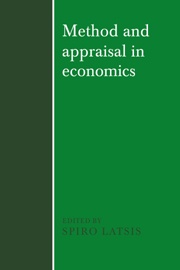Book contents
- Frontmatter
- Contents
- Preface
- A research programme in economics
- Economics and psychology: the death and resurrection of a research programme
- Schools, ‘revolutions’ and research programmes in economic theory
- Anomaly and the development of economics: the case of the Leontief paradox
- From substantive to procedural rationality
- Kuhn versus Lakatos or Paradigms versus research programmes in the history of economics
- On the history and philosophy of science and economics
- ‘Revolutions’ in economics
- Index
Anomaly and the development of economics: the case of the Leontief paradox
Published online by Cambridge University Press: 23 November 2009
- Frontmatter
- Contents
- Preface
- A research programme in economics
- Economics and psychology: the death and resurrection of a research programme
- Schools, ‘revolutions’ and research programmes in economic theory
- Anomaly and the development of economics: the case of the Leontief paradox
- From substantive to procedural rationality
- Kuhn versus Lakatos or Paradigms versus research programmes in the history of economics
- On the history and philosophy of science and economics
- ‘Revolutions’ in economics
- Index
Summary
There is a widespread belief that it is neither necessary nor becoming to a working scientist to attend too closely to methodology. In economics this belief at times finds expression in a curious disjunction between lip service paid to falsificationist ideals and an altogether different practice with respect to anomalies. In pragmatic terms there may be nothing inconsistent about this. For in the influential form of falsificationism propagated among economists by Milton Friedman, in which the most important mark of a good theory is the (relative) accuracy of its predictions, no guidance is given the researcher as to where he should turn when one or another of his hypotheses appears to have been contraverted. Faced with a choice between specifying new propositions and acquiring the data and devising tests appropriate thereto and making adjustments to improve the fit of one already articulated, the economist will, by dint of his training, if for no other reason, choose the latter, less costly, alternative. This is a negative and somewhat specific line of defence, but it serves to highlight the fundamental problem that must be faced by a researcher of falsificationist bent, namely that he cannot judge the importance of an anomaly except in relation to a developed underlying research programme.
- Type
- Chapter
- Information
- Method and Appraisal in Economics , pp. 109 - 128Publisher: Cambridge University PressPrint publication year: 1976
- 16
- Cited by



